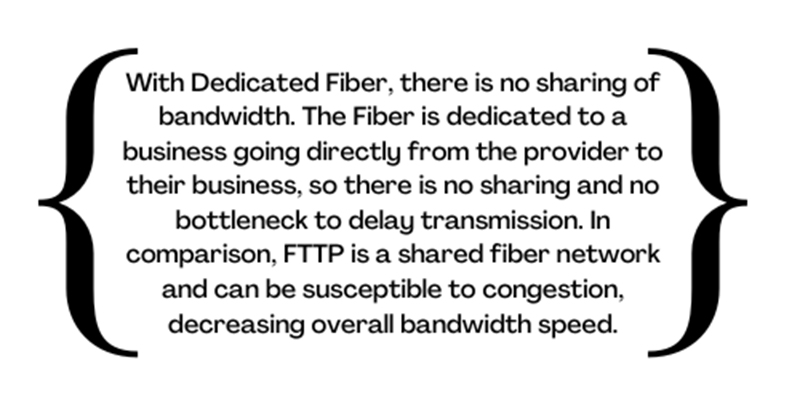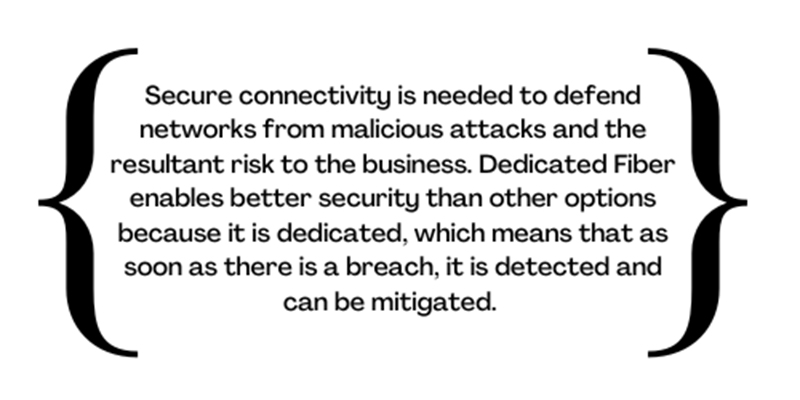
How to get the right connectivity for your business - by Nick Dristiliaris

There’s a great demand for fast, secure, flexible, and reliable connectivity, but with all the options available, it’s often hard to know exactly what to choose. Here are some considerations to help select the best solution based on business needs.
Flexibility/Scalability
Flexible and scalable network connectivity is vital to help an enterprise quickly adapt to new and evolving environments and futureproof networks for business success. This was evident when the COVID-19 pandemic hit, and companies had to promptly reevaluate their needs and upgrade connectivity to accommodate increased digital interaction with both customers and newly remote employees. In these instances, Dedicated Fiber is an excellent choice because capacity can often be quickly upgraded without the need to replace the physical line as business needs and technologies evolve.
Dedicated Fiber is also more flexible when adding customization. A business can separate services and add individual features with their own switches and routers. This is an essential solution for businesses operating from multiple locations. Speeds and bandwidth can also be scaled to support mission-critical applications as needed.

Security
Secure connectivity is needed to defend networks from malicious attacks and the resultant risk to the business. Dedicated Fiber enables better security than other options because it is dedicated, which means that as soon as there is a breach, it is detected and can be mitigated. Malicious tapping of fiber-optic communication technology is incredibly difficult. Because attempts to physically tap fiber cables will likely break the glass fibers, potential hacks can be quickly and easily discovered. In contrast, copper cable transmits data using electricity, and data may be intercepted more easily by hackers connecting taps to a line to pick up electronic signals.
Also, Dedicated Fiber networks are designed for point-to-point-to-multipoint applications, secured with the ability to utilize Layer 2 and MPLS networks for multi-locations, L2 to offsite backup, direct connection to cloud providers, etc. In contrast, FTTP is less secure as all subscriber’s data is sent over the same connection.
For even more reliability, businesses can easily add solutions such as DDoS Protection to their Dedicated Fiber connection for security and proactive monitoring to keep abreast of any outages and maintenance.
Speed/Latency
For many businesses, even a millisecond of latency can translate into significant revenue loss. Dedicated Fiber is the fastest choice for ultra-low latency because data on Fiber travels at the speed of light. Fiber also has greater bandwidth with symmetrical speeds from 100Mbps up to 100Gbps to enable the fastest speeds for your data. The symmetrical upload and download capabilities of Fiber mean a business will have consistent speeds in both directions. In contrast, with copper networks, the upload speed is significantly lower than the download speed for less consistency.
In addition, with Dedicated Fiber, there is no sharing of bandwidth. The Fiber is dedicated to a business going directly from the provider to their business, so there is no sharing and no bottleneck to delay transmission. In comparison, FTTP is a shared fiber network and can be susceptible to congestion, decreasing overall bandwidth speed.

Reliability/Availability
Several factors can cause outages when an organization is reliant on copper cable-based networks, such as temperature fluctuations, severe weather conditions, and moisture. However, fiber cable is immune to these environmental issues making it the most reliable medium for data transmission.
What’s more, it is also impervious to electrometric interference (EMI) and radio-frequency interference (RFI), crosstalk, impedance problem, etc. Fiber cable can be applied next to industrial equipment without worry.
When Fiber is used in a ring topology, there is even greater protection in the event of a fiber cut because there are two distinctive paths for the data to travel. Dedicated Fiber is also offered with SLAs and MTTR (Mean Time To Repair), whereas FTTP is not.
Dedicated Fiber has improved availability because the ability to control bandwidth allocation enables the ability to prioritize critical data such as voice and video for improved quality of service (QoS) and cost of service (CoS). In contrast, FTTP connectivity has shared bandwidth, so there is not complete control of bandwidth allocation and availability of services.
Support
It’s important to partner with a strategic network partner who is aligned with a business’s expanding goals and has the expertise to help assess needs and implement solutions. When partnering with a strategic network provider rather than multiple vendors, concerns of potential system malfunctions are mitigated, sensitive data is better protected, and staff is freed up to ensure uptime through compatible solutions.
See the original blog post here: https://ifmaboston.org/blog/26
Nick Dristiliaris is an account executive at Lightpath Enterprise, Boston, Mass.